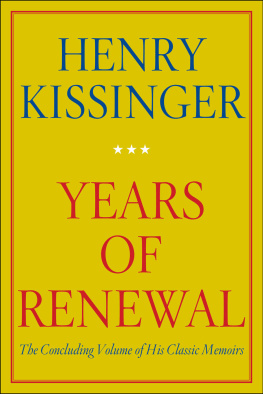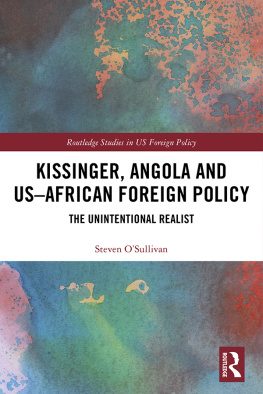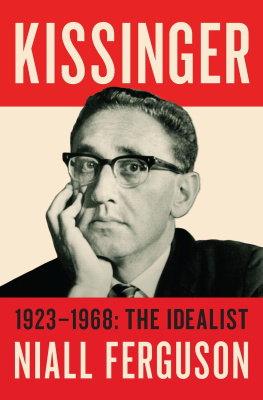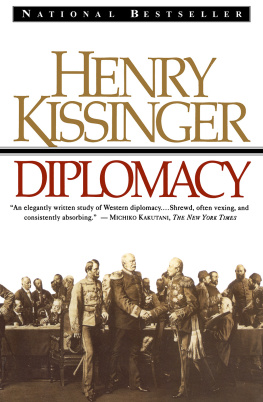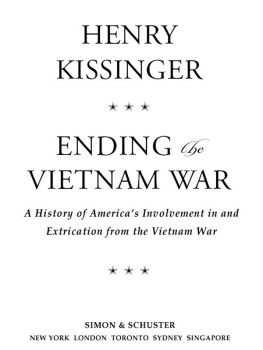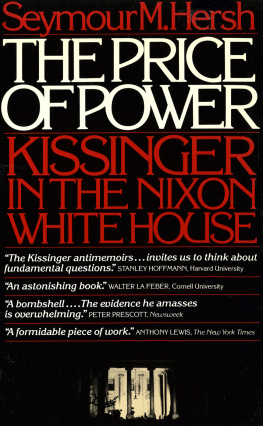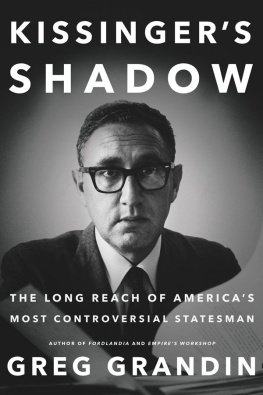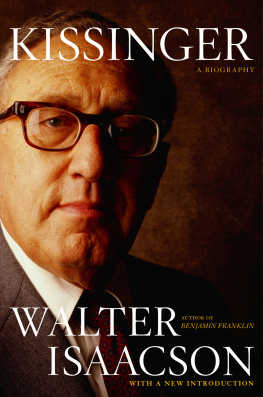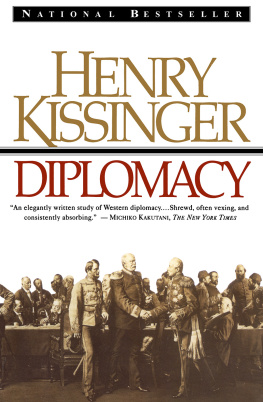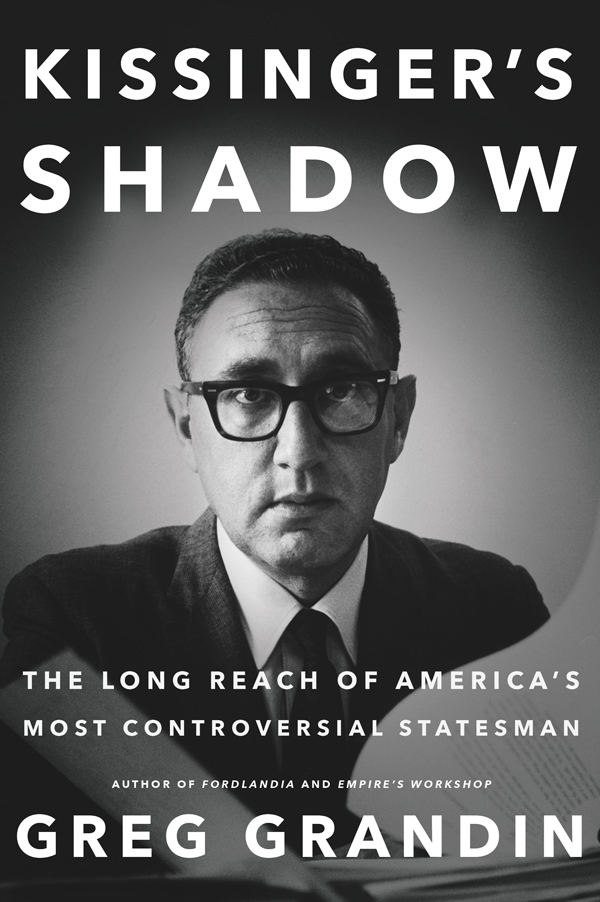Contents
Guide

The author and publisher have provided this e-book to you for your personal use only. You may not make this e-book publicly available in any way. Copyright infringement is against the law. If you believe the copy of this e-book you are reading infringes on the authors copyright, please notify the publisher at: us.macmillanusa.com/piracy.
For Eleanor and Manu, again
There are two kinds of realists: those who manipulate facts and those who create them. The West requires nothing so much as men able to create their own reality.
Henry Kissinger, 1963
Thomas Schelling, a Harvard economist and future Nobel Laureate, once asked Henry Kissinger what was more terrifying: seeing the monster or not seeing the monster?
It was early May 1970, just a few days after Richard Nixon appeared on TV and told the nation that the United States had sent ground troops into Cambodia. Nixon said that the operation was necessary to clear out enemy sanctuaries along the border with Vietnam. But his speech also made clear that something much more profound than military strategy had led to his decision to send ground troops into a neutral country. We live in an age of anarchy, the president said. We see mindless attacks on all the great institutions which have been created by free civilizations in the last 500 years. Nixon suggested that he had invaded Cambodia not just in response to a foreign threat but to domestic disorder: It is not our power but our will and character that is being tested tonight. For months, Nixon and Kissinger, his national security adviser, had said they had a plan to get the United States out of Vietnam. Now, suddenly, they were widening the war into a neighboring country. Four days after Nixons speech, National Guardsmen opened fire at Kent State, killing four students who were protesting the invasion. Nine more were wounded. Two weeks later, at Jackson State, police shot into a group of protesting African American students, killing two and wounding twelve.
Schelling bore some intellectual responsibility for Americas involvement in Vietnam. He had a mind like a computer, which he used to apply mathematical formulas to military strategy. Whether one was deterring the Russians or deterring ones own children, he said, the problem was the same: to figure out the proper ratio of threat to incentive. Lyndon B. Johnson and his secretary of defense, Robert McNamara, directly applied Schellings theories, bombing North Vietnam as a form of behavior modification. Schelling also had a large influence on the men who would take over Americas Vietnam policy from Johnson and McNamara, particularly on Henry Kissinger. Kissinger had taught at Harvard before he joined the Nixon White House and he considered Schelling a friend. He had adopted the economists insights, especially the idea that bargaining power comes from the capacity to hurt, to cause sheer pain and damage. It was a sentiment that Kissinger would try to operationalize in Southeast Asia.
By 1970, though, Schelling had turned against the war, and the US invasion of Cambodia prompted him, along with eleven other prominent Harvard professors, to travel to Washington to meet with Kissinger and register their objections. This was no ordinary group of antiwar intellectuals. Over the years, different labels have been applied to the kind of men who moved easily between Washington and Cambridge, between the classroom and the war room: the Eastern establishment, the best and the brightest, the power elite. These were them. The Harvard delegation included two Nobel laureates, a future Nobel laureate (Schelling), physicists, chemists, economists, and political scientists. Many of them were former advisers to presidents going back to Harry Truman. A number of the group had been involved in executing policies that led to early American involvement in Vietnam.
Serious men, they took their break with the administration seriously. This is too much, one told a reporter, referring to the invasion. Others were disturbed about the coarsening of public discourse brought on by the war. Professors and liberalssame thing, was how Nixons undersecretary of defense, David Packard, dismissed the delegation. One member, Ernest May, a Harvard dean and military historian with close ties to the Pentagon, told Kissinger: Youre tearing the country apart domestically.
Kissingers former colleagues werent aware that Nixon and Kissinger had already been secretly bombing Cambodia and Laos for over a year (and would continue to bomb for three more before Congress put an end to it). They knew only about the invasion, and that was bad enough. Sickening, Schelling said. Today in the United States, a shared and largely unquestioned assumption, irrespective of political affiliation, holds that Washington has the right to use military force against the safe havens of terrorists or potential terrorists, even if those havens are found in sovereign countries we are not at war with. This assumption was the premise of George W. Bushs 2002 invasion of Afghanistan and Barack Obamas expansion of drone attacks in Somalia, Yemen, and Pakistan, along with his most recent military operations against Islamic State militants in Syria and Iraq. This reasoning was not widely held in 1970. Schellings Harvard delegation rejected Kissingers attempt to justify the invasion by citing the need to destroy communist sanctuaries. As one reporter summed up the groups objections, violation of a neutral countrys sovereignty could be used by anyone else in the world as a precedent for invading another country, in order, for example, to clear out terrorists. Even if the invasion succeeded on its own terms and cleared out enemy sanctuaries, Schelling later told a journalist, it still wouldnt have been worth the invasion of another country.
The meeting with Kissinger took place in the old Situation Room in the White House basement. Schelling began by introducing the group and stating its purpose, but Kissinger interrupted him: I know who you are youre all good friends from Harvard University. No, said Schelling, were a group of people who have completely lost confidence in the ability of the White House to conduct our foreign policy and we have come to tell you so. We are no longer at your disposal as personal advisers. Kissinger, Schelling recalled later, went gray in the face, he slumped in his chair. I thought at the time that he suffered serious depression. At one point, Kissinger asked if someone could tell him what mistakes the administration had made. It was then that Schelling asked Kissinger the question about monsters: You look out the window, and you see a monster. And you turn to the guy standing next to you at the very same window, and say, Look, theres a monster. He then looks out the window and doesnt see a monster at all. How do you explain to him that there really is a monster?
Schelling continued: As we see it, there are two possibilities: Either, one, the President didnt understand when he went into Cambodia that he was invading another country; or two, he did understand.
We just dont know which one is scarier, Schelling said.
Henry Kissinger has been accused of many bad things. And when he dies, his critics will get a chance to rehearse the charges. Christopher Hitchens, who made the case that the former secretary of state should be tried as a war criminal, is himself gone. But theres a long witness-for-the-prosecution listreporters, historians, and lawyers eager to provide background on any of Kissingers actions in Cambodia, Laos, Vietnam, East Timor, Bangladesh, against the Kurds, in Chile, Argentina, Uruguay, and Cyprus, among other places.


